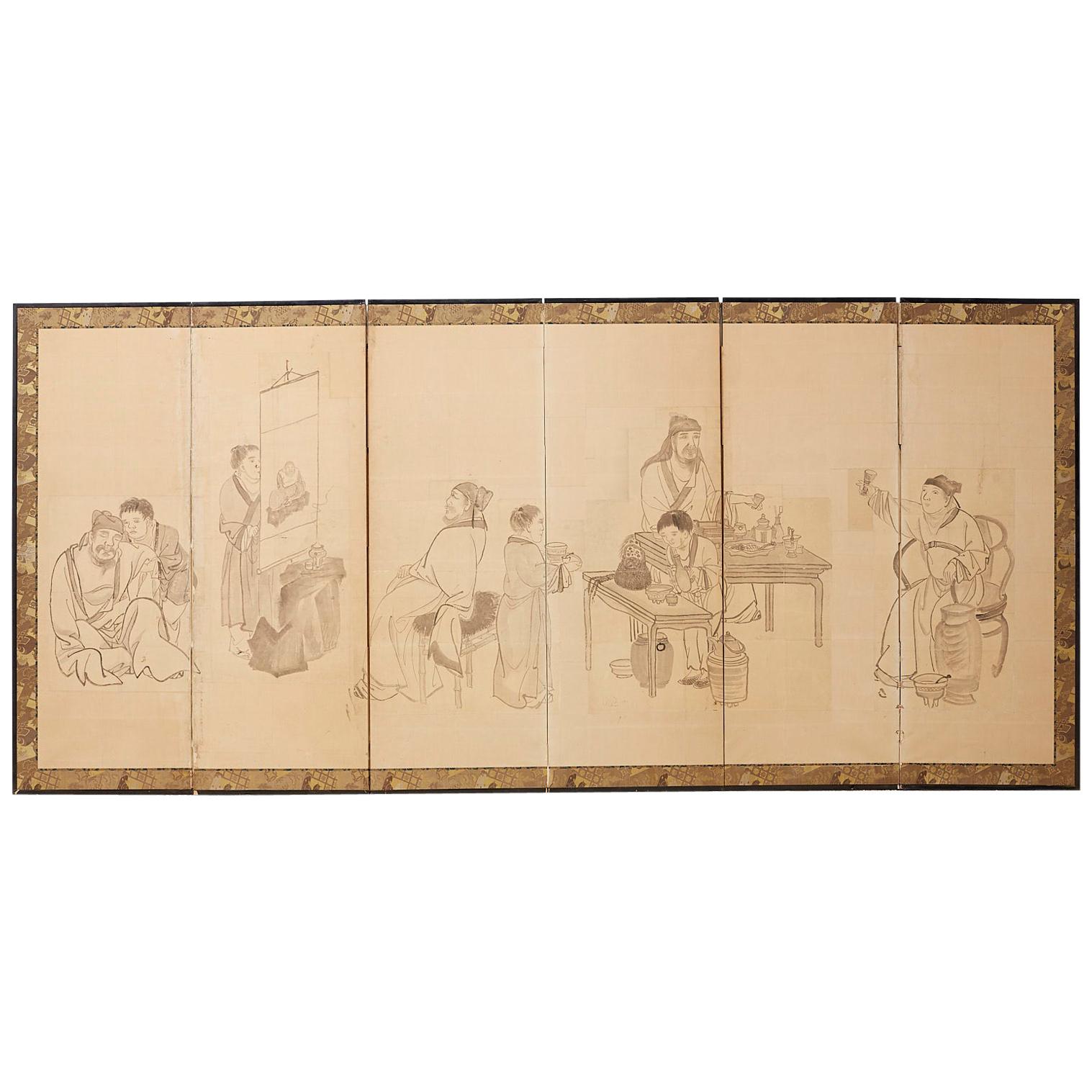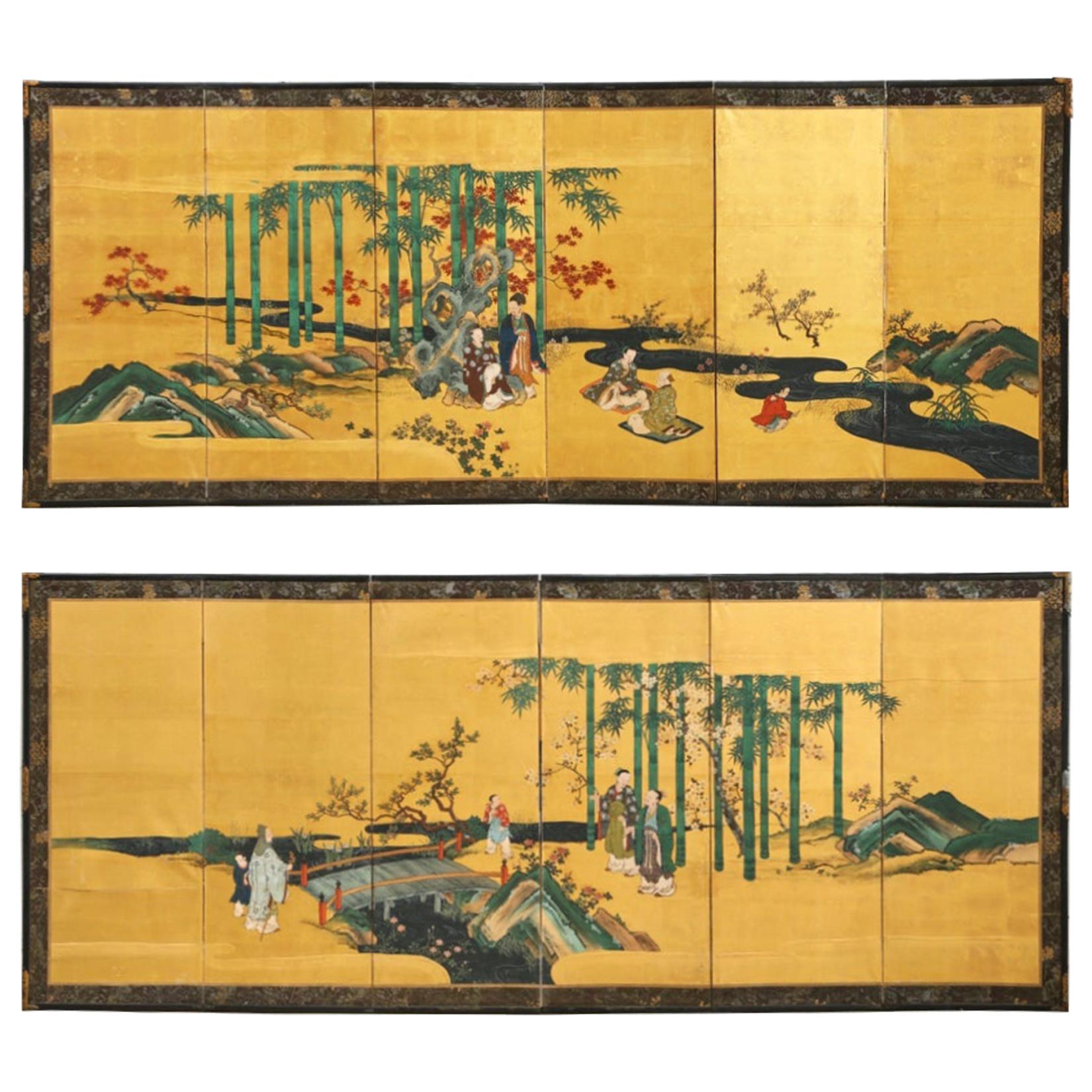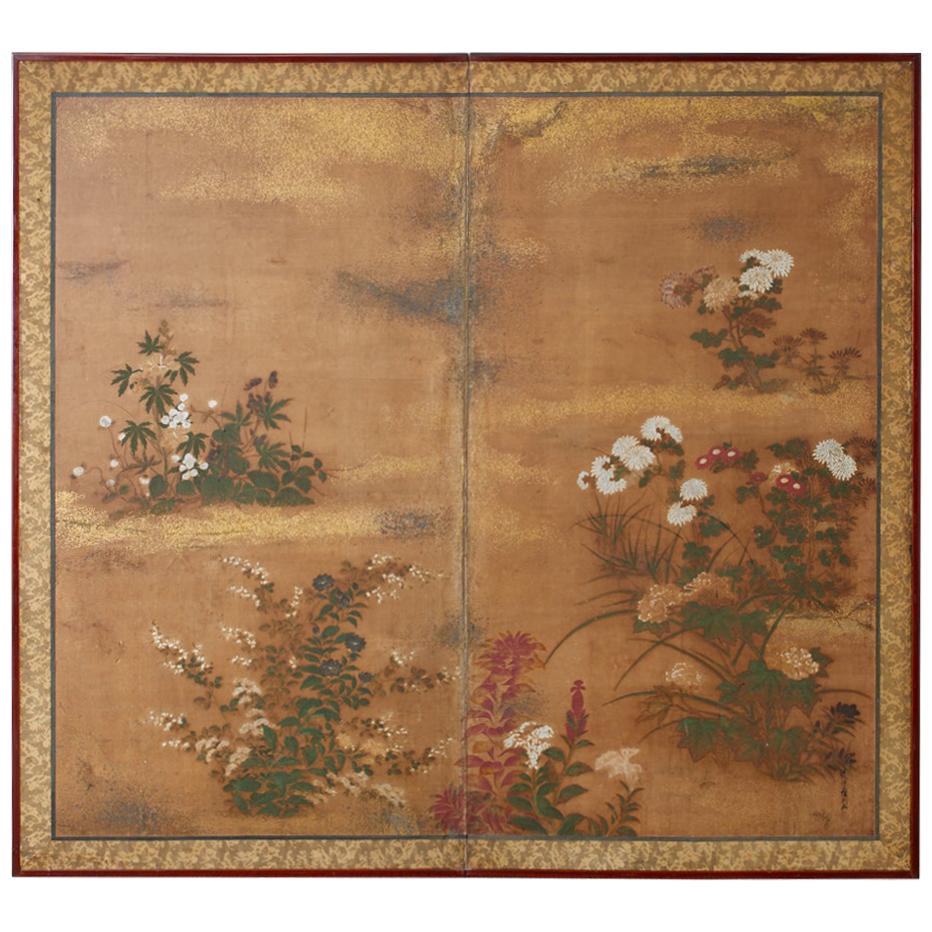Items Similar to Pair of Japanese Edo Period Six-Panel Screen, "100 Boys at Play"
Want more images or videos?
Request additional images or videos from the seller
1 of 16
Pair of Japanese Edo Period Six-Panel Screen, "100 Boys at Play"
About the Item
An absolutely charming pair of Japanese Tosa School six-panel folding screens painted with the "One Hundred Boys at Play" motif, featuring a multitude of boys in various pursuits in an elegant Chinese style pavilion, Edo Period, early 19th century, Japan.
The delightful pair of screens form one continuous scene of boys at play within a resplendent Chineses style garden and pavilion setting with a river coursing through. The rambunctious boys are portrayed dressed in finery and in various gentlemanly pursuits, including painting, calligraphy, music and the strategy game go. These are known as the Four Accomplishments, and were considered essential to skills of any gentleman scholar. Additional pursuits portrayed include poetry, drama and dancing.
The 100 Boys theme is a Chinese motif wishing there viewer many generations of accomplished scholars and prosperity.
The screens still vibrant due to the gold leaf and mineral pigments.
Measurements are for each screen.
For a similar pair of screens with the same motif, please see the ones in the collection of the Metropolitan Museum of Art, accession number 2009.260.1, .2.
Provenance: Ex. Bonhams, San Francisco.
- Dimensions:Height: 36.5 in (92.71 cm)Width: 105.5 in (267.97 cm)Depth: 0.75 in (1.91 cm)
- Sold As:Set of 2
- Style:Edo (Of the Period)
- Materials and Techniques:
- Place of Origin:
- Period:
- Date of Manufacture:circa 1800
- Condition:Wear consistent with age and use. Minor losses. Minor fading. With some light water staining visible, and some areas of possible restoration, as expected. Please see photos.
- Seller Location:Austin, TX
- Reference Number:1stDibs: LU894710304093
About the Seller
5.0
Platinum Seller
These expertly vetted sellers are 1stDibs' most experienced sellers and are rated highest by our customers.
Established in 2001
1stDibs seller since 2010
306 sales on 1stDibs
Typical response time: 1 hour
- ShippingRetrieving quote...Ships From: Austin, TX
- Return PolicyA return for this item may be initiated within 7 days of delivery.
More From This SellerView All
- Japanese Six Panel Screen with Hotei, Edo Period, Early 19th CenturyLocated in Austin, TXA delightful Japanese six panel painted paper screen featuring the beloved figure Hotei, Edo Period, early 19th century. Hotei, called Budai in China, and known as the Laughing Buddha or Fat Buddha in the West, is considered to be an emanation of Maitreya, the Buddha of the Future. In Japan, he also holds a special place as one of the Seven Lucky Gods, being the god of fortune, and protector of children. He is always portrayed as a mirthful and corpulent man, dressed in loose robes that show off his round belly. He carries a sack with him, said to be filled with treasure. As the protector of children, he is often portrayed with them playing on or around him, as he is here. The children portrayed in this screen are dressed in Chinese style clothing...Category
Antique Early 19th Century Japanese Edo Paintings and Screens
MaterialsSilk, Paper
- Tall Vintage Chinese Export Reverse Glass Painted Hardwood Framed Hanging PanelLocated in Austin, TXA very large vintage Chinese export reverse glass painted figural hanging wall panel in a carved hardwood frame, early to mid-20th century...Category
Mid-20th Century Chinese Qing Paintings and Screens
MaterialsGlass, Hardwood
- Large Framed Japanese Buddhist Amida Temple Hall Painting, Mid-19th CenturyLocated in Austin, TXA large and incredible Japanese painting of a Buddhist temple hall with Amida Nyorai, late Edo or early Meiji period, mid-19th century, Japan. Mounted wit...Category
Antique Mid-19th Century Japanese Meiji Paintings and Screens
MaterialsWood, Paint, Brocade, Silk, Acrylic
- Early 19th Century Chinese Hardwood, Lacquer and Jade Six-Panel ScreenLocated in Austin, TXA very fine mid-Qing Dynasty Chinese hardwood and lacquer six-panel screen, Jailing Period, circa 1800. The hardwood frame inset with black lacquer panels. One side features an over...Category
Antique Early 19th Century Chinese Qing Paintings and Screens
MaterialsCoral, Jade
- Pair of Japanese Edo Period Musha Ningyo Courtier DollsLocated in Austin, TXTwo exquisite Japanese musha ningyo dolls, crafted as courtiers, Edo Period, early 19th century, Japan. The older man can be identified as the h...Category
Antique Early 19th Century Japanese Edo Sculptures and Carvings
MaterialsShell, Brocade, Silk, Glass, Wood, Paint, Paper
- Large Antique Chinese Hand Painted Wallpaper Section in Carved Hardwood FrameLocated in Austin, TXA wonderfully charming large and colorful Chinese hand painted wallpaper section in a carved and shaped hardwood frame. The wallpaper dates to the first half of the 20th century or e...Category
Early 20th Century Chinese Chinese Export Paintings and Screens
MaterialsHardwood, Paper
You May Also Like
- Japanese Edo Period Six Panel Screen of Chinese ScholarsLocated in Rio Vista, CAFascinating 19th century Japanese late Edo period six pane funpon screen. Large scale depicting Chinese scholars and officials engaged in leis...Category
Antique 19th Century Japanese Edo Paintings and Screens
MaterialsWood, Paper, Silk
- Pair of Japanese Edo Six Panel Screens the Seven SagesLocated in Rio Vista, CAFantastic pair of 19th century Japanese late Edo/early Meiji period six-panel screens titled The seven sages of the bamboo grove. The Kano school screens...Category
Antique 19th Century Japanese Edo Paintings and Screens
MaterialsBrass, Gold Leaf
- Japanese Edo Six Panel Screen Yoshitsune and BenkeiLocated in Rio Vista, CASpectacular 19th century Japanese late Edo period six-panel byobu screen depicting Yoshitsune and Benkei, two heroes of Japanese folklore. Crafted in ink and natural color pigments on mulberry paper with thick gold leaf borders on each panel. The character Yoshitsune is seated under a blossoming cherry tree in full armor holding a fan. The warrior priest or monk Benkei is depicted kneeling on a leopard skin...Category
Antique 19th Century Japanese Edo Paintings and Screens
MaterialsBrass, Gold Leaf
- Edo Period 19th Century Japanese Folding Screen Six Panels Flowers on Gold LeafBy Rimpa SchoolLocated in Brescia, ITClouds of gold, water and many colorful flowers: Japanese six-panel folding screen by Rimpa School. Hand painted with rice mineral pigments and inks on rice paper and gold leaf.Category
Antique Early 19th Century Japanese Edo Paintings and Screens
MaterialsGold Leaf
- Japanese Edo Two-Panel Screen Flowers of AutumnLocated in Rio Vista, CAImpressive early 19th century Japanese Edo period two-panel screen featuring flowering plants and grasses of autumn. Painted in the Tosa School style Bunka Bunsei period or Ogosho pe...Category
Antique 19th Century Japanese Edo Paintings and Screens
MaterialsSilk, Wood, Paper
- Japanese Six Panel Screen, Snow Scene at Water’s EdgeLocated in Hudson, NYJapanese Six Panel Screen: Snow Scene at Water's Edge with Flowers and Waterfowl. Edo period painting (mid 19th century) of plum, bamboo, white camellias, cranes and mandarin ducks ...Category
Antique Mid-19th Century Japanese Edo Paintings and Screens
MaterialsGold Leaf
Recently Viewed
View AllMore Ways To Browse
Japanese Edo
Period Screens
Japanese Edo Period
Pair Screens
Pair Of Screens
Paneled Folding Screens
One Panel Screen
Dress Screen
Edo Wood
Pair Hand Painted Panels
Japanese Wood Painted Panels
Japanese Painted Wood Panel
Six Panel Screen
Gold Leaf Art Pair
Japanese Painting Edo
Edo Paint
Chinese Paper Screens
Japanese Style Dress





